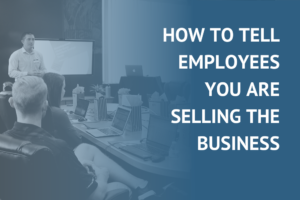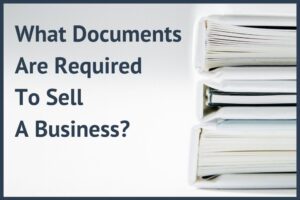There is no way of knowing exactly who is going to express interest in buying your business once you decide to sell. However, the type of potential buyer you begin negotiating with will directly affect certain aspects of your deal.
Generally speaking there are 3 main types of potential buyers for your business. There are individual buyers, strategic buyers, and financial buyers. Individual buyers make up the majority of the market and are simply individuals looking to purchase a small or middle market business. Strategic buyers are individuals with experience and a vested interest either directly or indirectly in your industry. Last we have financial buyers, these are groups of investors looking to invest in or purchase a business.
Why Does The Type Of Buyer Matter?
When you make the decision to sell your business, you have to be prepared to deal with the different types of buyers you may encounter. Each buyer type brings with it a unique set of variables and intentions that you must understand if you intend to get the most out of your deal. You will be at a disadvantage in the selling process if you don’t understand the type of buyer you are negotiating with and the objectives they are targeting when evaluating your business.
The overall time it takes to close your deal once you enter into an agreement with an investor is also affected greatly by their motivations. In this article I will breakdown the 3 main types of buyers and explain the specific attributes they bring to the acquisition process.
1. Individual Buyers
Individual buyers make up the majority of investors that are looking to purchase a small or middle market business. They are entrepreneurs just like you that are looking to run their own business. Oftentimes they will be coming from a traditional job and may have a good understanding of your industry. However, because individual buyers are typically first time investors they are looking to replace their current compensation first and foremost. This means they intend to be an owner operator and will be looking for a good employee infrastructure and owner training before fully taking control of the business. To take advantage of this, consider strengthening these areas and structuring your marketing materials, discussions, and agreements around supporting them in your deal.
Individual buyer deals tend to close the quickest and involve the least amount of due diligence. The nature of their operational involvement and the need for them to support their family and lifestyle means that these types of buyers are motivated to start. However, things like transitioning from their current role or relocation can affect the closing timeline.
The financing side is more than likely the area where you may experience some hang-ups when dealing with individual buyers. They commonly will use the SBA loan program to procure financing, and if everything goes according to plan the time from when they apply to when they close should average 45 to 90 days. Now, because of this they will be hyper focused on how much bank financing they can bring to the deal. Leaving you in a position where the success of your deal relies on the purchasing power of the buyer. A common option that may make your business more attractive to individual buyers is for you to provide some type of owner financing. This means a portion of the deal will be financed by you the seller, typically between 20 and 50 percent, and the remainder will commonly come from the SBA loan.
Go in ahead of time with an idea of your level of comfort with owner financing and keep in mind…the deal that is not bankable is hard to get done with an individual buyer.
2. Strategic Buyers
The second most common type of buyer you may encounter is the strategic buyer. They will bring an entirely different process and intent when evaluation your business. Strategic buyers are usually business owners who operate within your industry. This type of buyer is motivated by the potential expansion of their current business. They are most likely looking to buy your business to either expand into new markets, decrease competition, or integrate a portion of your business into their own. It should be expected that a strategic buyer will change the current structure of your business as they decide what has value to their operation.
You can see strategic deals done across all levels of business, from main street all the way up to fortune 500 companies. A local HVAC company could buy one of their competitors or Disney can acquire Marvel Entertainment; in either case they both are examples of strategic deals. These types of deals can take longer to close than a standard individual buyer due to the need for a detailed integration plan, but, if you can stand to wait you will certainly see some upside. Strategic buyers are rarely motivated by your business’s financial performance and are instead looking at the product or service value you provide. Overall, this is great news for you because their access to capital and targeted objectives means that strategic buyers may be willing to pay an unusually high price for your business.
3. Financial Buyers
The last and least common type of buyer for main street and middle market businesses is the financial buyer. A financial buyer is usually a private equity group or high net worth individual that is looking for a positive financial return on investment. Unlike both individual and strategic buyers, they most likely will not have a specific interest in your industry or product. Most buyers of this type are assessing your business’s ability to generate revenue and eventually turn a profit when they decide to exit, which is typically 3 to 5 years.
Financial buyers will bring a clearly outlined risk-reward perspective to your deal. This means that the price they are willing to pay is highly dependent on the level of risk in your business. If your business poses a high risk to the buyer, you should expect their offer amount to reflect that risk. Your ability to show strong earnings and future growth will greatly impact the quality of the offer when dealing with financial buyers. However, no matter who the buyer is those are both critical components of any deal.
Conclusion
Your understanding of the 3 types of potential buyers will help you better prepare for when you decide to sell your business. Each type of buyer presents a different process and overall objective for closing your deal. When looking to sell your business, it is important to know exactly which type of buyer is most suitable for your deal so you can begin to prepare. Your level of preparation leading up to listing, in marketing materials, and during negotiations will directly impact your success.
All of this can be a challenge and may require the guidance of a qualified business broker, you can learn more about that here. I hope this article provided some useful information and that you have continued business success.




